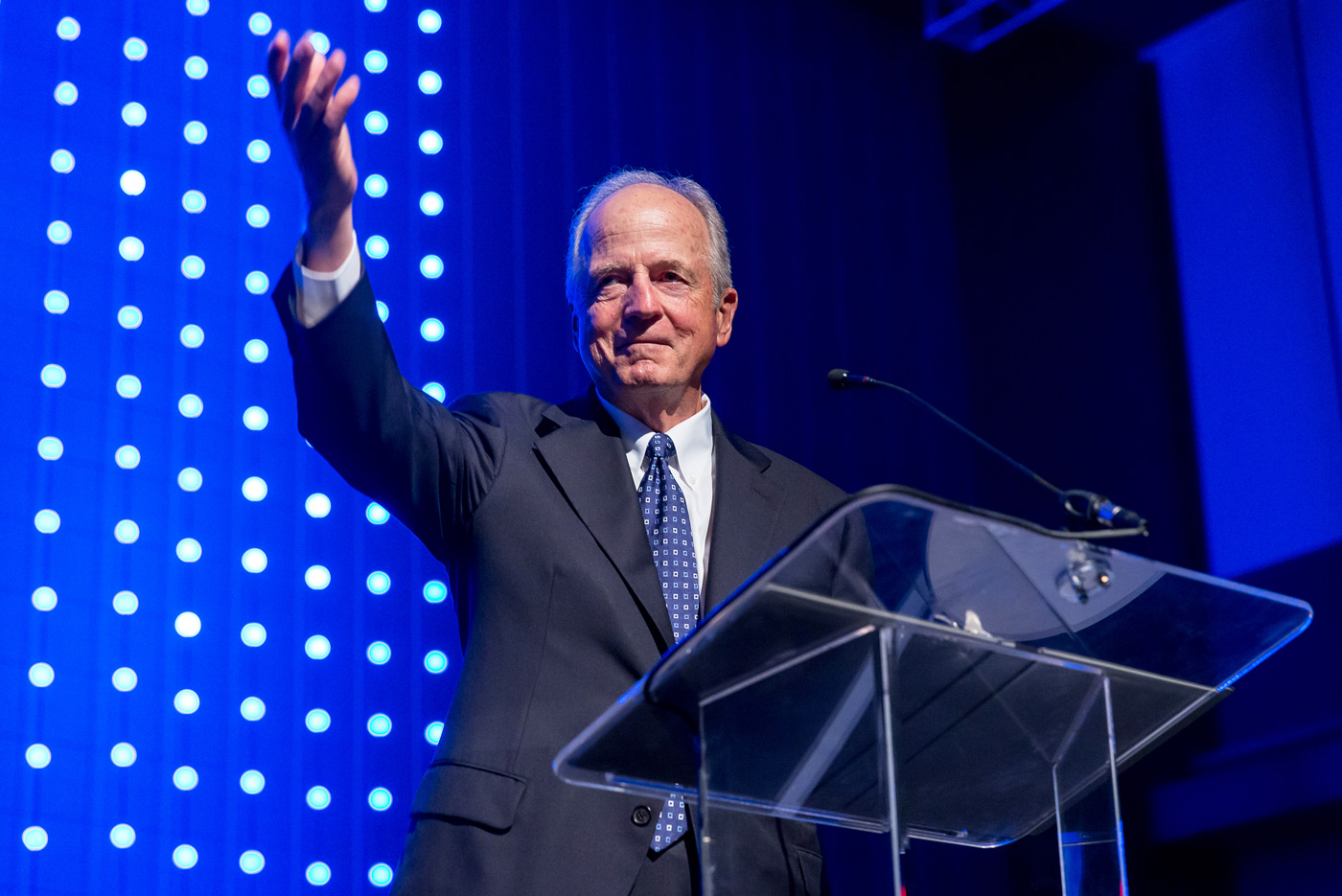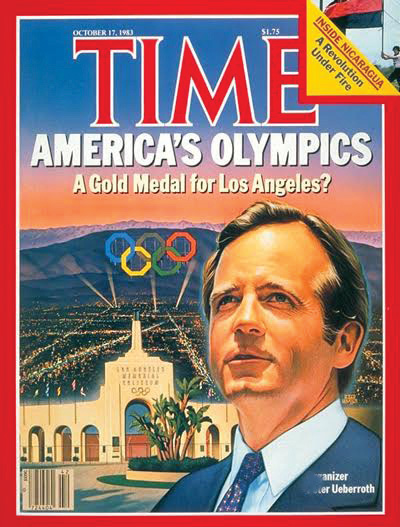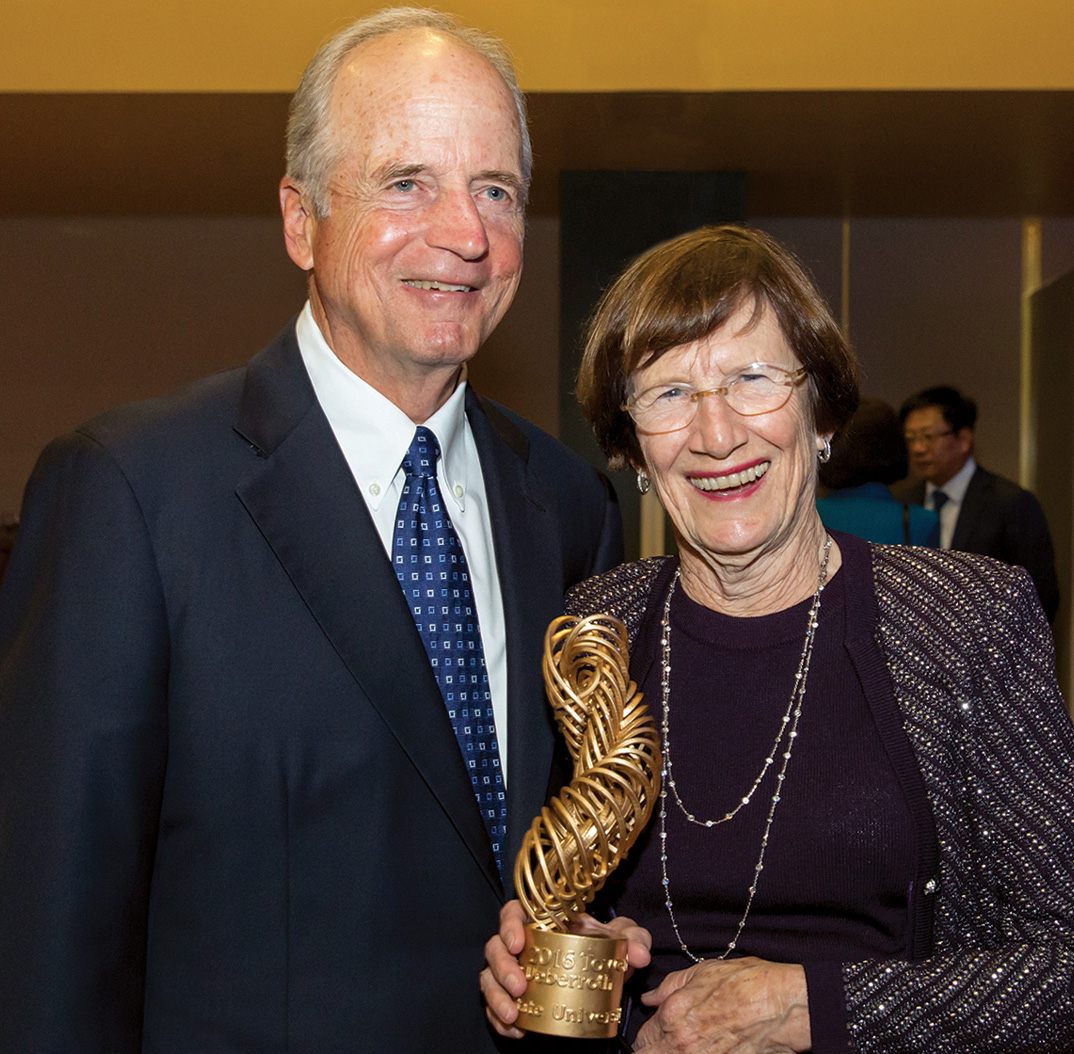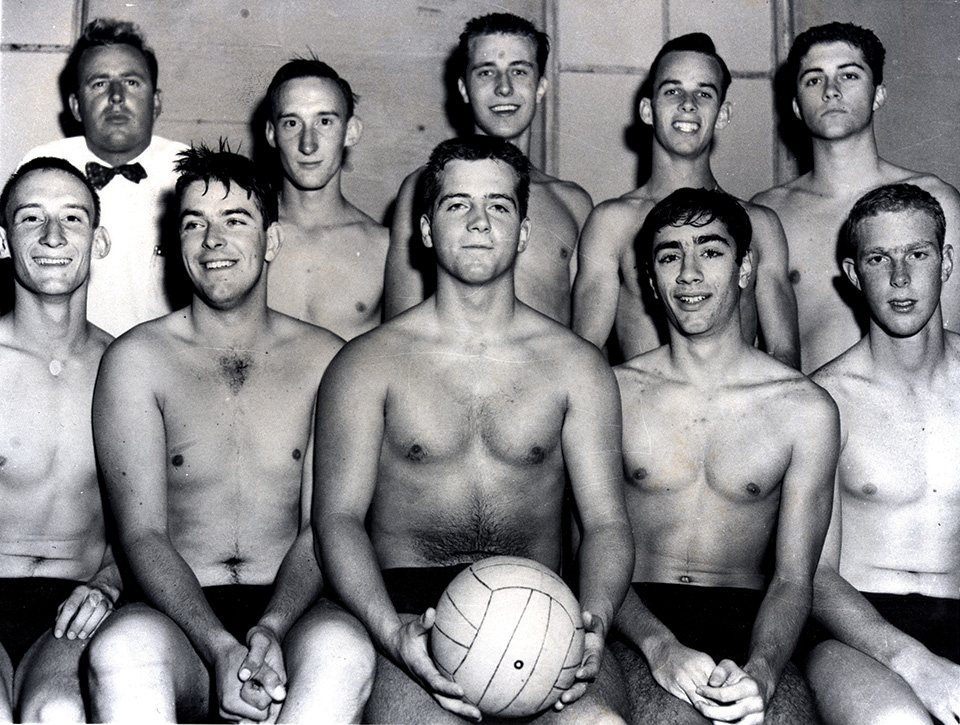Upping the Game
A Q&A with Peter Ueberroth
The career of sports leader, businessman and philanthropist Peter Ueberroth, ’59 Management, ’86 Honorary Doctorate, covers a lot of territory: travel industry executive, CEO of the Los Angeles Olympic Organizing Committee for the 1984 Olympic games, Major League Baseball commissioner (1984-89), current chairman of Contrarian Group and co-owner of the Pebble Beach Company. A Time magazine Person of the Year and author of the bestseller Made in America, he competed in the 1956 U.S. Olympic water polo trials while still a student at SJSU. With some of his college teammates, he helped revive and finance the sport at SJSU in 2015 after a 34-year hiatus. This year, his alma mater honored him with its highest accolade, the SJSU Tower Award.

Photo: David Schmitz
“Team sports teach you about the rest of your life. You learn to rely on others. On a team, everybody has got to play.”
Why did you decide to come to San José State?
My high school football coach was Kent Stanger, who’d been a great football player at San José State, and he introduced me to Ed Rudloff, San José State’s water polo coach and the Olympic Club coach. I’d never seen a water polo ball before that, never played a game. They set up a goal at the end of the swimming pool and had me get in the water, swim, throw the ball. Then Rudloff got in the water, and we mixed it up a bit. When he said he’d like to offer me a scholarship at San José State in water polo, I told him “No chance. I’ve got a job.” But he went to see my parents and said: “You know, I’d really like your son to consider college. I think it’ll be good for him.” I wouldn’t have considered going to a college if not for Ed Rudloff and Kent Stanger. They were life-changers. And they convinced my parents. And once my parents supported the idea, I figured: people I love and respect, who care for me, are trying to do what’s best for me. I’d be a little dumb to pass on their unanimous decision that I try college.
And it turned out to be a good decision?
I had a great time at San José State. I made lots of friends. And best of all, I met Ginny Nicholas from Long Beach, California. When she ran for student body secretary, I saw a picture of her on campus. “She’s pretty,” I told my fraternity brother (who was a pledge). He said: “Oh, I know her.” I said: “Okay. Here’s your assignment. Introduce me to her. Do it in a week. I want to meet her.” And he did. Ginny and I had lots in common. I was able to convince her, once I graduated, to get married. So going to San José State enabled me to meet my partner for life—there’s nothing more important than that. But there were other benefits, too. When I was going to school, I started to see opportunities, expanded my vision. I thought: “You know, I can do whatever I want to do. I can be whatever I want to be.” The freedom of decision-making. There’s no class for it, but all the classes combined to give me that. Professor Scott Norwood encouraged me to set very high goals and to develop leadership skills.
What did playing sports teach you about life?
Rely on others. If you’re out there by yourself, and think you can make an impact on the world, you’re wrong. On a team, everybody’s got to play. Get a group of people to work together and respect each other—and that includes all races, religions, creeds, colors and especially genders. Get the best people in every spot and treat them fairly. In life, in families, in marriages, in everything: teams win; individuals lose.
You started your first business at a very young age. How did that come about?
I did start a business in my early twenties, a small travel company. But I also started working at a very young age. I had jobs as a 12-year-old, a 13-year-old, a 14-year-old. I had a year-round job through the last two and a half years of high school and all through college. I’ve always liked working, and I’m still working today.
What made you choose the travel industry?
Because it’s easy entry. You need an office. You need a telephone. You need a couple of people who are talented and know the world and have a curiosity about the world who are going to give good service to customers. Pretty simple. We started out with a couple of offices in Southern California, then grew the business, competing against American Express and Thomas Cook—household names. The managers of our branches were shareholders, so the company became very successful and was purchased by another company in Minneapolis. Now it’s the largest travel agency chain in the world, Carlson Wagonlit.
You were the CEO of the 1984 Olympics in Los Angeles. Were you recruited for that position?
People ask how I got involved in the Olympic Games. Here’s the real answer: nobody wanted them at the time. Why? The M’s. The killings in Munich. Fires, more violence, more problems in Mexico City. And the cost. Montreal didn’t finish paying for the 1976 games until after the year 2000. Eighty percent of Los Angeles voters, including me, voted against hosting the Olympic Games because to do so was going to bankrupt the city. Then a group of people led by John Argue, Paul Ziffren, Lew Wasserman and Mayor Tom Bradley got together and said: “What about a private group?” So Los Angeles’ private committee was awarded the Games. When my name came up as someone to run the Games, I told them I wasn’t going to be a candidate, but if they elected me, I’d do it.
What were some of the differences between the 1984 Olympic Games and previous games?
The newspapers called it “the Los Angeles Olympic Games.” But we put the Games in 29 different cities, in nine different counties and in three states. That’s where the Olympic Games were; they were not in Los Angeles. We were able to add all types of women-only events, from synchronized swimming to the women’s marathon. China came for the first time in history and brought a team. The press predicted failure: nobody would show up; there’d be a deficit. I have pages and pages of negative Los Angeles Times headlines—“Ueberroth is a Failure,” “Ueberroth Has Done Wrong.” The Games fooled everyone. They were the most attended up until that date. There was an enormous surplus. They were a smashing success—not because of me, because of the team of 50,000 citizens who made the private Los Angeles Olympic Games a success with no government money and no donations.

1984 Time magazine’s Person of the Year.
Did you know you were in the running for Time magazine’s Person of the Year in 1984?
I was one of, I think, eight people interviewed. And they said at the time: “We’re interviewing you for a story in Time and you might—might—become Person of the Year.” After the Olympic Games, I’d gone on a cruise and was writing a book about the Games. When we came back, I went up to a 7-11 to get some stuff for the house—unshaven, wearing shorts. I looked at the magazine rack, and there I was: “Person of the Year.” Nobody informed me. It really was a surprise. I grabbed all six copies. The guy behind the counter said: “Sir, you can’t take all six. I have other customers coming in.” And I said: “If I can prove to you I’m the person on that cover, can I buy all six?” So I showed him my driver’s license, and he let me buy all six.
How soon after the Olympics did you become Major League Baseball commissioner?
Bob Lurie, who owned the San Francisco Giants, was the first to recommend me to his fellow owners. I was actually elected commissioner in March of 1984, before the Games, but I didn’t take office until September 1 so that I could finish the Olympic Games assignment. Then my family and I moved to New York, and I did my full term.
What was the state of professional baseball at that point?
I found baseball in disarray—major disarray. Only a couple of teams were making money. The rest were losing money left, right, and center. The sport was losing popularity. Lots of teams had been sold and were trying to move to new cities. Television contracts were nonexistent. Lots of problems. I’d promised to do the job for one term, so everybody knew it wasn’t going to be my long-time career. But I was going to try and leave baseball in a much healthier position.

Ueberroth and his wife, Ginny, attended Inspiration to Innovation, a gala held in March at SJSU’s Student Union, where he received the 2016 Tower Award (Photo: David Schmitz).
When you were Major League Baseball commissioner, you helped to keep teams in their cities. You averted an umpire strike. You helped teams become more financially solvent. Did you enjoy that job?
I enjoyed baseball very much. But, truth be known, I’m a West Coast person, and I wanted to get back here.
You’ve accomplished so much. To what do you attribute your success?
I’ve accomplished some things, but I’m not anywhere near done. I like to find challenges that nobody else wants to tackle. When I can find something that’s never been tried this way or that way, I get interested. And I’m looking every day, looking forward, living in the future—not the past. What I’m usually able to do is come up with an idea about how to structure something. And then get enough people who believe the same principle, so that we can accomplish X. My skill is seeing an opportunity. But I don’t seek it unless I think it will make this globe we’re on better in some small way. Whatever it is, you’ve got to do it better.






